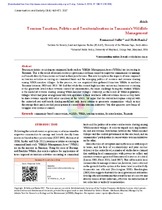Tourism taxation, politics and territorialisation in Tanzania’s wildlife management
Abstract
Tourism activities occurring on communal lands such as Wildlife Management Areas (WMAs) are increasing in
Tanzania. This is the result of natural resources governance reforms aimed to empower communities to manage
and benefit directly from resources found in their jurisdictions. This article explores the impacts of taxes imposed
on tourism activities occurring on communal lands and the emerging politics of resource and revenue sharing
among WMA member villages. In the process, we use empirical data gathered from two WMAs in northern
Tanzania between 2006 and 2016. We find that while the current high tax rates on tourism businesses occurring
at the grassroots level reduce revenue earned by communities, the main challenge facing the studied WMAs
is the model of revenue sharing among WMA member villages. Currently, as the result of WMA regulations,
villages which had prior arrangement with tour operators in their land have suffered revenue losses as they have
to share revenue equally with other members of the WMA. We argue that the current tax regime coupled with
the contested cost and benefit sharing model not only lower returns to grassroots communities--which in turn
discourage their much needed participation in conservation-tourism initiatives--but also generate new forms of
struggles over resource control.

